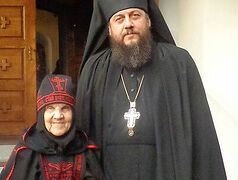—There exists the opinion that monasteries are for those who never develop a love life. Please tell us, how did you end up at a monastery?
—I’ve always felt, since childhood, that I couldn’t live like everybody else. I told my mother, and she got very scared, saying: “It’s better not to say that, because then you’ll suddenly go to a monastery.” My mother is Orthodox, but she’s still getting integrated into Church life.
—How did you find out about the monastery?
—In school we read the life of St. Euphrosyne of Polotsk. I was amazed by her life. Of course, I forgot about it then, but somewhere in the depths of my soul, the hope that maybe I would join a monastery someday was born.
When I was fourteen, I started going to Sunday School. Like any teenager, I had a double life. For me it was that I had to decide: either be Orthodox, that is, renounce the joys of the world, or live a secular life. It was like this: On Saturday I’d go to a club, and on Sunday, I’d go to Sunday School. And the Lord gave me grace at the school—I wanted to listen. I didn’t see the teacher—I only heard the Lord Himself speaking to me through them, and this was nourishment for my soul.
This choice constantly tormented me: It was difficult to reconcile the Church and worldly life. If you do it, do it all the way. When I finished eleventh grade, I started preparing myself internally that I would eventually leave the world. The Lord gave me such a vision then: All things will pass. While you’re young, the world smiles at you, but after a few years, you’ll realize it’s a deception.
Then one day Sister Photinia came to our Sunday School, and we became friends. It turned out she also wanted to go to a monastery, and we went to see St. Elisabeth Convent. When I stepped inside, I felt like even the air was different. I liked it right away.
The second time I came, it was for good. My family didn’t believe it at first; they thought I’d come back soon enough. But my decision was firm.
 The first sisters and spiritual father of St. Elisabeth Convent
The first sisters and spiritual father of St. Elisabeth Convent
Initially, it was a joy to live in the monastery; everything seemed beautiful. Then there came a temptation, and I thought: “I have to get out of here.” I would look at people, and they were walking, smiling, and I had one thought: “What nuts. What have they all gathered here for?”
—Is it not allowed to smile?
—We didn’t really joke around in my family. It was considered that a joke was something that could offend or hurt someone.
I was scared, and I decided to leave, but I postponed my departure until evening, then till the following morning, then I thought I would wait. And by the fourth day, the desire to leave was gone, and I saw the beauty in everything again.
—Did you ever think you’d made a mistake?
—No. When I was at home, I didn’t like big noisy crowds. It wasn’t interesting for me; my soul was tormented by the empty conversations that young people have. I sat at home in the evenings, my soul inexplicably yearned, and sometimes I would say: “Mom, I want to go home.” But my mom didn’t understand: “You are at home. What do you mean you want to go home?” I would say: “I don’t know, I just feel like I want to go home.”
I felt bad that I was just sitting around and wasting time—every minute of life is precious. I wanted to spend this minute doing good, to give it to God, so life wouldn’t be just vegetating, but serving God and neighbor. Outwardly, everything was fine. It would seem I had everything, I was loved, but my soul felt out of place, that it wasn’t where it was supposed to be.
—And now you’re at home?
—Yes. And the next step home is the Kingdom of Heaven.
This is what it was like when I lived with my parents: I’d sit at the window, looking down from the eighth floor at the little tiny people amidst the giant buildings. And I’d think: “My life could be cut off right now, and how would I stand before God? How would I answer Him?”
I was troubled by these thoughts. But in the monastery I know: If not because of my merits, then by the prayers of the sisters, through the intercession of St. Nicholas, may the Lord have mercy.
—St. Ambrose of Optina wrote: “To live in a monastery, you need not a cart-full of patience, but a whole caravan.” Is there much that you have to endure here?
—The monastery has all the conditions for the spiritual life. If there’s nothing to endure externally, then within us there’s a world where we have to toil away, sometimes imperceptible to those around us. The most difficult thing is to be patient with yourself. The Lord humbles a person in a monastery. In the world, I had great pride: I was praised everywhere, accepted everywhere. But here I realized that I don’t know how to do anything, I don’t know anything.
From my first days in the monastery, if I allowed any sin to enter, for example, condemnation, my soul greatly suffered from it. Even the white walls of the monastery seemed dark and gloomy. But when I realized the cause of my suffering and asked for forgiveness from God, the Lord took away the whole burden. Some people say when it’s hard: “That’s it. I’m not going to do anything, I’m going to die.” But my soul starts looking for help.
—You’re the youngest nun at the monastery. How old are you?
—I’m eighteen now, and I’ve been in the monastery for two years already.
—Do you sense that the sisters treat you specially?
—Yes, and it really annoyed me at first. Because my mom considered me an adult since childhood, and even when she let me go to the monastery, she said: “I know you’re an adult and you won’t choose anything bad for yourself.” It was hard for my mother when I was young; she was lonely, and I was her only friend. When I was about three years old, she could talk to me about various things, as with someone who understands everything and sees everything. So when the sisters in the monastery talk with me like I’m a child, it’s uncomfortable and hard for me.
—Can you tell us about your burning desires?
—There are so many of them! As a child, I had a desire: If I don’t do anything worthwhile in this life, let me at least do something great, some kind of self-sacrifice at the end of my life, for example, to cover someone with myself, as they write in hero stories; that is, to sacrifice myself for another. Like the martyrs. They didn’t betray God, but I constantly betray him inwardly. That’s the dream I had—to suffer for others, for God.
Many people desire prayer, spiritual feats, but now I would just like humility. The one thing my soul wants is to be humbled. When you humble yourself, you have everything: Prayer, and labors, and you notice people and you love everyone. Although it’s very hard to love, because when you love someone, you let all his sorrows and troubles into your soul, and you worry, and you pray.
We go to the children’s ward at the hospital. You look at the sick children and you think: What if your prayers are the only thing that can help them? Sometimes your soul is pained for some children, that there’s no one to protect them from the terrible world around them. This pain turns into your own pain (for yourself). Perhaps this child is suffering from the fact that you’re living negligently in the monastery; you don’t use God’s gift for good, but conceal it within yourself. It’s not just your soul that suffers from this, but the souls of the children you’re visiting. You want to help them, but you see that there’s nothing you can do. The only thing you can do is to say: “Lord, have mercy.”
 Archpriest Andrew Lemeshonok in the children’s ward
Archpriest Andrew Lemeshonok in the children’s ward
—What do you wish for those living in the world?
—I would like to wish that when things are hard for them, that they would not lose hope, but flee to God; that they might hear God.
Originally published in Russian in the journal Meeting #31, 2006






